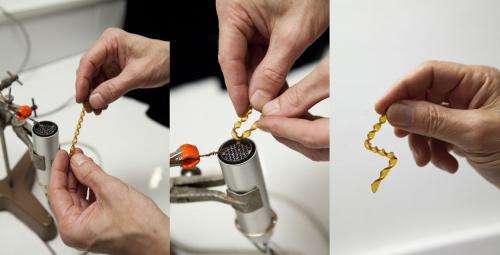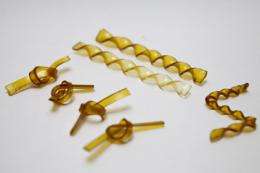French team invents tough, reheatable plastic (w/ video)

A common feature of sailboards, aircraft and electronic circuits is that they all contain resins used for their lightness, strength and resistance. However, once cured, these resins can no longer be reshaped. Only certain inorganic compounds, including glass, offered this possibility until now.
Combining such properties in a single material seemed impossible until a team led by Ludwik Leibler, CNRS researcher, developed a new class of compounds capable of this remarkable feat. Repairable and recyclable, this novel material can be shaped at will and in a reversible manner at high temperature. And, quite surprisingly, it also retains certain properties specific to organic resins and rubbers: it is light, insoluble and difficult to break. Inexpensive and easy to produce, this material could be used in numerous industrial applications, particularly in the automobile, aeronautics, building, electronics and leisure sectors. This work is published on 18 November 2011 in Science.
Replacing metals by lighter but just as efficient materials is a necessity for numerous industries, such as aeronautics, car manufacturing, building, electronics and sports industry. Due to their exceptional mechanical strength and thermal and chemical resistance, composite materials based on thermosetting resins are currently the most suitable. However, such resins must be cured in situ, using from the outset the definitive shape of the part to be produced. In fact, once these resins have hardened, welding and repair become impossible. In addition, even when hot, it is impossible to reshape parts in the manner of a blacksmith or glassmaker.
This is because glass (inorganic silica) is a unique material: once heated, it changes from a solid to a liquid state in a very progressive manner (glass transition), which means it can be shaped as required without using molds. Conceiving highly resistant materials that can be repaired and are infinitely malleable, like glass, is a real challenge both in economic and ecological terms. It requires a material that is capable of flowing when hot, while being insoluble and neither as brittle nor as “heavy” as glass.
From ingredients that are currently available and used in industry (epoxy resins, hardeners, catalysts, etc.), French researchers developed a novel organic material made of a molecular network with original properties: under the action of heat, this network is capable of reorganizing itself without altering the number of cross-links between its atoms. This novel material goes from the liquid to the solid state or vice versa, just like glass. Until now, only silica and some inorganic compounds were known to show this type of behavior. The material thus acts like purely organic silica. It is insoluble even when heated above its glass transition temperature.

Remarkably, at room temperature, it resembles either hard or soft elastic solids, depending on the chosen composition. In both cases, it has the same characteristics as thermosetting resins and rubbers currently used in industry, namely lightness, resistance and insolubility. Most importantly, it has a significant advantage over the latter as it is reshapeable at will and can be repaired and recycled under the action of heat. This property means it can undergo transformations using methods that cannot be envisaged either for thermosetting resins or for conventional plastic materials. In particular, it makes it possible to produce shapes that are difficult or even impossible to obtain by molding or for which making a mold is too expensive for the envisaged purpose.
Used as the basis of composites, this new material could therefore favorably compete with metals and find extensive applications in sectors as diverse as electronics, car manufacturing, construction, aeronautics or printing. In addition to these applications, these results shed unexpected light on a fundamental problem: the physics of glass transition.
More information: Silica-Like Malleable Materials from Permanent Organic Networks, Science 18 November 2011: Vol. 334 no. 6058 pp. 965-968. DOI: 10.1126/science.1212648
ABSTRACT
Permanently cross-linked materials have outstanding mechanical properties and solvent resistance, but they cannot be processed and reshaped once synthesized. Non–cross-linked polymers and those with reversible cross-links are processable, but they are soluble. We designed epoxy networks that can rearrange their topology by exchange reactions without depolymerization and showed that they are insoluble and processable. Unlike organic compounds and polymers whose viscosity varies abruptly near the glass transition, these networks show Arrhenius-like gradual viscosity variations like those of vitreous silica. Like silica, the materials can be wrought and welded to make complex objects by local heating without the use of molds. The concept of a glass made by reversible topology freezing in epoxy networks can be readily scaled up for applications and generalized to other chemistries.
Journal information: Science
Provided by CNRS




















